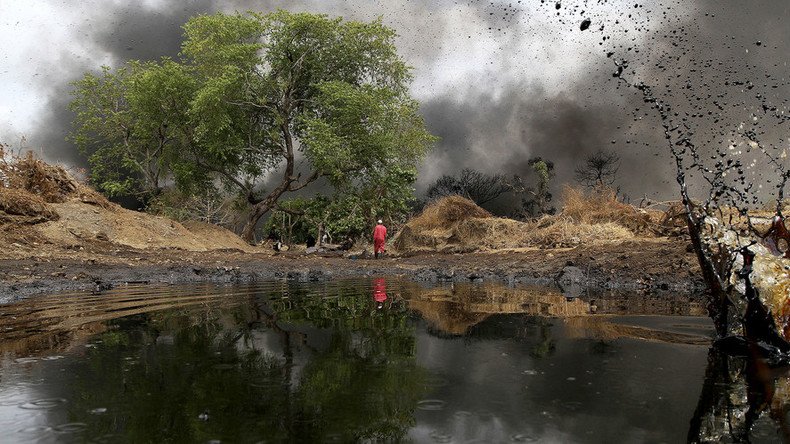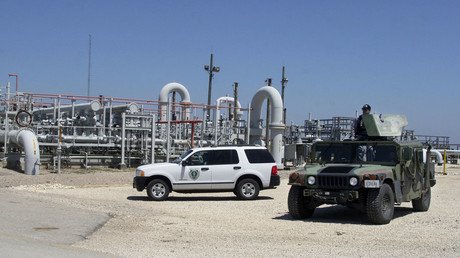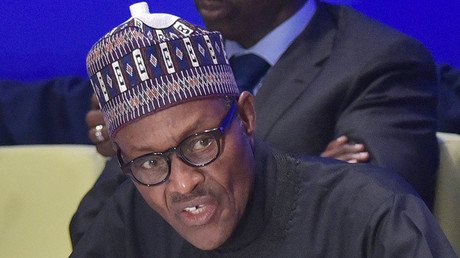Shame on Shell: Ecocide by oil extraction in the Niger Delta

Millions of barrels of oil have been spilled in Nigeria’s Delta region. Tired of the abuse, Nigerians just blew up a pipeline and a platform in an attempt to rectify what politicians and courts have been slow to do.
As a result of the deteriorating security situation, the Nigeria oil union announced that Shell and Chevron workers have been evacuated.
On a strip of cork that I have attached to the wall in my home office hangs a yellowing postcard that reads, “What makes Shell Oil think it can get away with murder? . . . Because it already has.” And, then, below the fold, the murder of Ken Saro-Wiwa and what became known as the Ogoni Nine is described in excruciating detail. Was Shell Oil guilty of murder?
In 2009, while not admitting guilt, Shell Oil settled the case brought by the family members of the Ogoni Nine just before going to trial under the Alien Tort Claims Act, which allows foreigners to sue others in U.S. Courts for genocide, war crimes, crimes against humanity, torture, and other violations of international law.
Saro-Wiwa was the president of the Movement for the Survival of Ogoni People (MOSOP), an organization that fought against the spoliation of indigenous land by the Nigerian Federal Government and foreign oil companies. Activists were reportedly killed because of their demands for a clean environment, as well as allowing for farming and revenue sharing from the Niger Delta area.
Shell Oil isn’t the only company that needs to come clean about its dirty dealings in Nigeria. Chevron has been engaged in the same dirty practices, including allegedly supplying the Nigerian government with armaments to kill peaceful protestors. Unfortunately, the Nigerian victims lost their legal case against Chevron, filed in the U.S. Thereafter, the US Supreme Court whittled away at the principle of universal jurisdiction that the ATCA represented. The Supreme Court ruled that the Alien Tort Claims Act could not be used to sue corporations in the event of human rights violations. Thus, an acknowledgement that justice against oil companies is “slippery” at best.
Despite a 2011 United Nations Environment Program investigation finding serious environmental and public health concerns, little has been done to rectify the situation. Friends of the Earth estimates that some 400,000 tons of oil have been spilled in the Niger Delta by these oil companies, largely with impunity. Human Rights Watch has also documented the devastation and the abuse. In December 2015, a Netherlands court ruled that four Nigerian farmers and Friends of the Earth can sue Shell for its repeated oil spills.
On March 1, 2016, two lawsuits were filed in London on behalf of Delta communities. Amnesty International even issued a press release warning Shell investors that these two lawsuits were coming. At this point, I am reminded of President John Kennedy’s admonition, “Those who make peaceful revolution impossible will make violent revolution inevitable.”
And so, last week, Chevron was besieged by Nigerians who want the dirty practices of oil companies in their country to cease. Funny, the media labeled these Nigerians “militants,” but attached no such label to the practices of oil companies devastating the area ever since their arrival in the 1950s. These companies have ruined the area, stolen resources, and engaged in bribery and corruption in their refusal to pay a fair price for Nigerian oil. Currently, Shell and Italy’s Eni are under investigation for corruption. This is exactly the kind of behavior that is rewarded in high capitalist circles.
The story gets more distressing. While the Nigerians eke out a living as best they can on contaminated land, the CEO of Royal Dutch Shell reportedly was paid more than Euros 24 million in 2014. Tensions are now at the boiling point. Last week, a group calling itself The Niger Delta Avengers blew up a Chevron platform last week, totally destroying it. This follows an attack on a Shell pipeline in February. Why? Shell admits to having neglectfully committed over 1,500 oil spills in the Niger Delta, amounting to over 55 million liters just since 2007! Amnesty International claims that the actual number is much higher. Nigerians ask, how can we lead normal lives when our land is so polluted and despoiled?
Nigerians are not alone in their struggles against oil companies: Chevron settled a case in Burma and recently abandoned its last argument in an attempt to evade justice for Ecuador. The company faces a $10 billion judgment against its toxic waste discharged onto indigenous lands, resulting in adverse health effects including cancer and death. The game is rigged against communities and for corporations; there is no such thing as a level playing field. It is abundantly clear that these oil companies have committed what ought to be a crime of ecocide.
Moreover, Nigerians who are trying to fight corruption blame the United Kingdom for serving as a safe harbor for ill-gotten gains. Calling London the “capital of money laundering,” Nigeria’s anti-corruption chief estimated that Nigeria had lost $37 billion to London as a destination for money that the country desperately needs, especially with the drop in the price of oil. Nigeria’s President, Muhammadu Buhari, tacitly acknowledged London’s role in Nigeria’s corruption problem and said of U.K. Prime Minister David Cameron, “What I am demanding is a return of assets.” I agree that this would be a good place to start, but I won’t hold my breath on that.
Compare what these companies are accused of doing in Nigeria to the situation in the U.S. faced by Baltimore’s Ronald Hammond who was sentenced to prison for 20 years for $40 worth of cocaine and less than $5 worth of marijuana. Or the New Orleans case of Bernard Noble, stopped while riding his bicycle, and found to have two marijuana cigarettes in his possession. Noble was sentenced to 13 years in prison.
Neither President Obama nor the U.S. Congress has taken to task U.S. corporations that are committing crimes in Nigeria or elsewhere. And I suspect that the U.S. wargaming an occupation of Nigeria is for just in case Nigerians’ demands for justice get out of hand and “threaten U.S. interests.”
American voters must not remain willfully blind to the huge crimes being committed by corporations that, at the same time, receive huge U.S. tax breaks. (Yes, Shell Oil receives huge tax breaks from U.S. taxpayers). In a way, these crimes are being committed in the name of every U.S. taxpayer, who, in the end, also bears some responsibility for ending them.
The statements, views and opinions expressed in this column are solely those of the author and do not necessarily represent those of RT.















